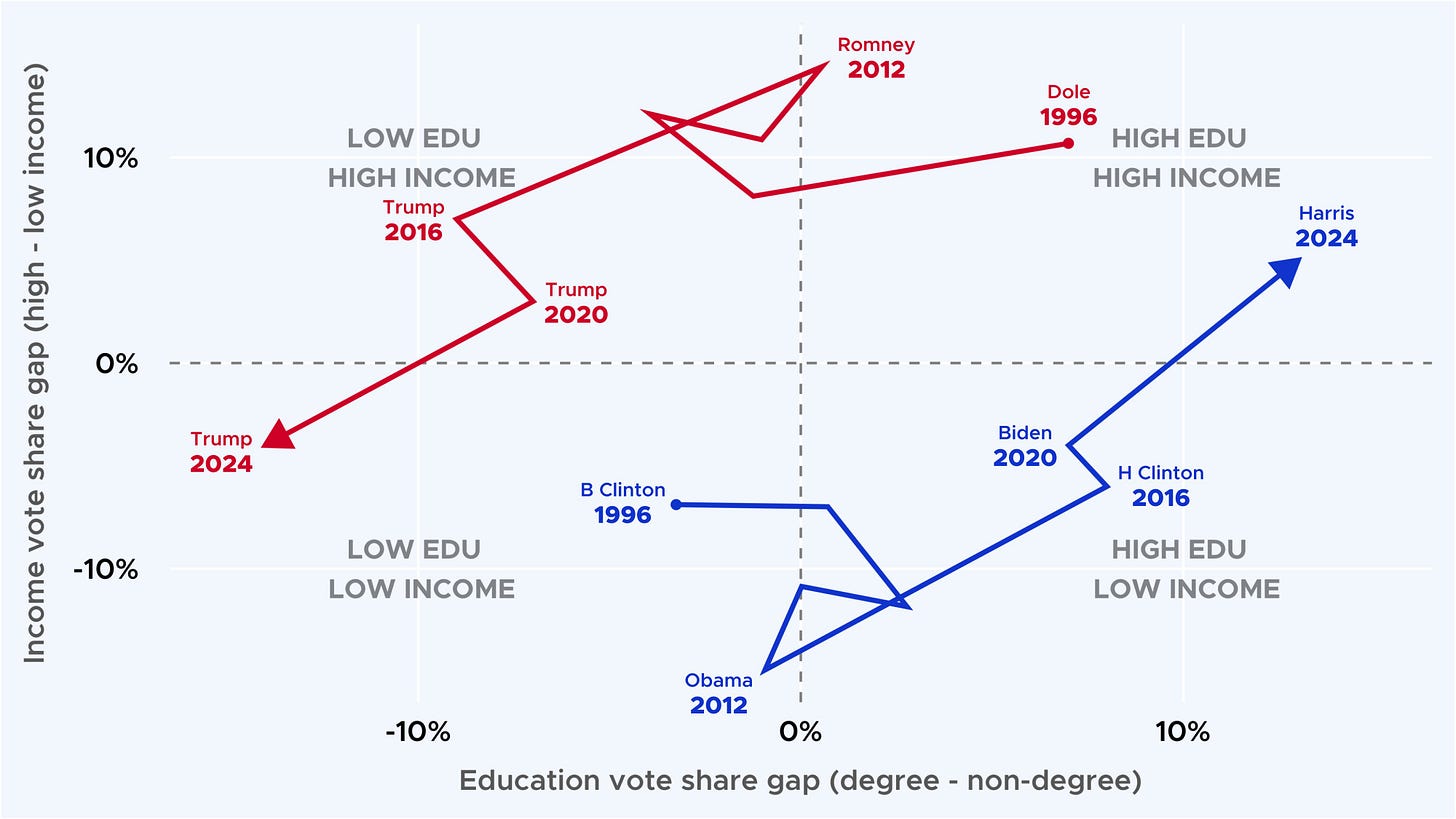Here are some things that appear true to me about the election.
There is a racially diverse working-class coalition.
Since 2012, the Democratic Party has become the party of high education and high income, while the Republican Party has become the party of the working-class. There is now, at long last, a racially diverse working-class voting bloc in the United States. It was assembled by clunky, crude, "man in time" cultural means, but it is now real. It has a certain set of institutions and aesthetics and tastes that the left must learn about. And it voted for Donald Trump.
There are two economies.
It appears that general economic indicators (e.g., GDP, employment rate, etc.) and the lived working-class experience of the economy have diverged. Many chock this up to a combination of unrealistic expectations, misinformation, and the elitist idea that working class people being idiots. There is also the fact that basically every party, right and left, across the globe that oversaw the management of COVID inflation got destroyed in subsequent elections. But I think this is still to miss the point: I think it’s much more simply explained by the contradictions of capitalism. The United States is in a moment of unbelievable inequality. There are two economies, and so two things can be true at once: GPD, the stock market, inflation, whatever can all be doing well and the working-class can feel like they’re drowning.
No more elitist aesthetics, for now.
It seems like there is no path to the presidency through elitist aesthetics. No more Beyonce and Dick Cheney, sorry. No more pant suits and scripted appearances. Authenticity is king now, which is why robust primary processes are important, because it’s extremely hard to positively measure authenticity. It’s not a check box on a resume. As much as we might think that “you know it when you see it,” it’s probably even more true to say that “you know it when you don’t see it.”
Now we will see the contradictions of the right.
The Republicans have gotten by for more than a decade on self-victimization and criticality. What building a coalition on grievance and aesthetics enables is the brushing aside of real material differences. It also allows for their adversaries on the left to be lazy, pushing back on how dumb and fucking annoying their vibes are rather than identifying and drawing out their inherent actual contradictions. For instance, as I have pointed out in previous posts, you cannot actually re-shore tons of industry and do a bunch of tariffs and make everything cheaper because cheapness is the whole point of globalism.
It might also shock you to know that abortion is tearing the conservative coalition apart, with the populist Barstool conservatives remaining very pro-choice while the elitist National conservatives being generally pro-life. For instance, even Joe Rogan recently told JD Vance that he basically saw the overturning of Roe v. Wade as “religious men who are trying to dictate what women can and can’t do with their bodies,” to which Vance responded: “Yeah.” Rogan endorsed Trump.
Similarly, Dave Portnoy, founder of Barstool Sports (see: Barstool conservative) said after the overturning of Roe that, “We are literally going backwards in time. It makes no sense how anybody thinks it's their right to tell a woman what to do with her body. If that is an issue, I vote Democrat.” In September, Portnoy said that he was voting for Trump. He said he had “no choice but to vote for him because of the campaign that the Democrats ran” built on “pure arrogance and the moral superiority.” You might disagree with this, but you also might be arrogant.
On the National Conservative side, it might shock you to know that JD Vance and Vivek Ramaswamy agree on virtually zero policy issues, from the role of the administrative state to what it means to be American.
Do you remember when Vance introduced a Senate bill with Elizabeth Warren to "claw back" executive pay from leaders of failed banks? Probably not, right, or that after this Politico called Vance and Warren “the new power couple taking on Wall Street.” You might have also never heard about Vance’s support for Biden FTC Commissioner Lina Khan’s efforts to break up big-tech companies: “I don’t agree with Lina Khan on every issue, to be clear, but I think that she’s been very smart about trying to go after some of these big tech companies that monopolize what we’re allowed to say in our own country” (on CBS).
The reason you’re not likely to have heard of this stuff is twofold. First, we on the left generally do not take people on the right seriously. Second, Vance has been unbelievably inconsistent on all of these issues. He contradicts himself constantly, and as someone who actually has taken him seriously for years, it’s very hard to pin him down. But that’s what’s about to happen: they will be pinned down.
Our job now is to take them seriously, to pin them down, and, where they exist, draw out the inherent contradictions in their coalition. Where there are points of agreement, say between Vance and Khan, we must try to build bridges. Not only because this destroys the myth of an intractable civil war-level polarization that fuels MAGA politics, but because doing good things that improve people’s life should be the sole goal of politics.





I found it to be a very enlightening and educational article. For someone who lives outside the US, like me, who lives in Spain, it is difficult to understand the keys to the current American political process. For this reason, Jesse Callahan's article has helped me understand this moment of social change in the United States.
Outstanding essay - wrenchingly accurate